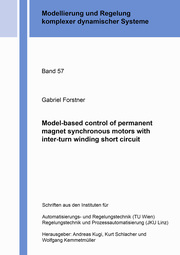Detailansicht
Model-based control of permanent magnet synchronous motors with inter-turn winding short circuit
Modellierung und Regelung komplexer dynamischer Systeme 57
ISBN/EAN: 9783844085013
Umbreit-Nr.: 5165133
Sprache:
Englisch
Umfang: 120 S., 12 farbige Illustr., 41 Illustr.
Format in cm:
Einband:
kartoniertes Buch
Erschienen am 26.04.2022
Auflage: 1/2022
- Zusatztext
- System reliability and fault tolerance are essential features in safety-critical applications with permanent magnet synchronous motors (PMSMs). An inter-turn winding short circuit is one of the most common and serious fault cases in PMSMs. Hence, the fault-tolerant control of PMSMs with an inter-turn winding short circuit is a crucial task. This work aims for an optimal fault-tolerant operation of PMSMs in case of an inter-turn winding short circuit. For this task, a magnetic equivalent circuit (MEC) based modeling framework is derived. MECs allow for the systematic consideration of magnetic saturation and non-fundamental wave behavior of electric motors. The high model accuracy of the resulting real-time capable model is demonstrated by a comparison with measurements both in the fault-free case and in case of an inter-turn winding short circuit for a three-phase and a dual three-phase PMSM, respectively. The MEC model of the PMSMs builds the foundation for the design of a model-based fault-identification scheme and a model-based fault-tolerant torque control strategy. The characteristic parameters of the winding fault are estimated by the fault-identification method and subsequently used in the fault-tolerant control algorithm. The developed nonlinear control strategy has a cascaded structure comprising a one-step model-predictive control (MPC) and subordinate PI current controllers. The feasibility of the model-based fault-identification scheme and the high torque control performance of the proposed fault-tolerant control strategy is proven by a number of different experiments performed on a test stand with the three-phase PMSM. Moreover, the advantages of the dual three-phase PMSM regarding fault tolerance are demonstrated in numerical simulations.
